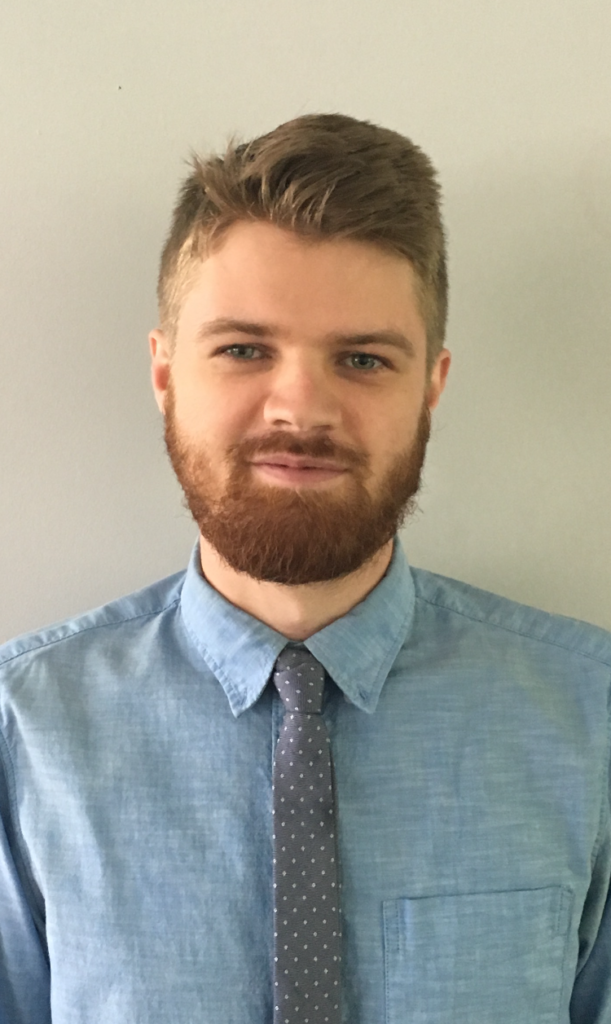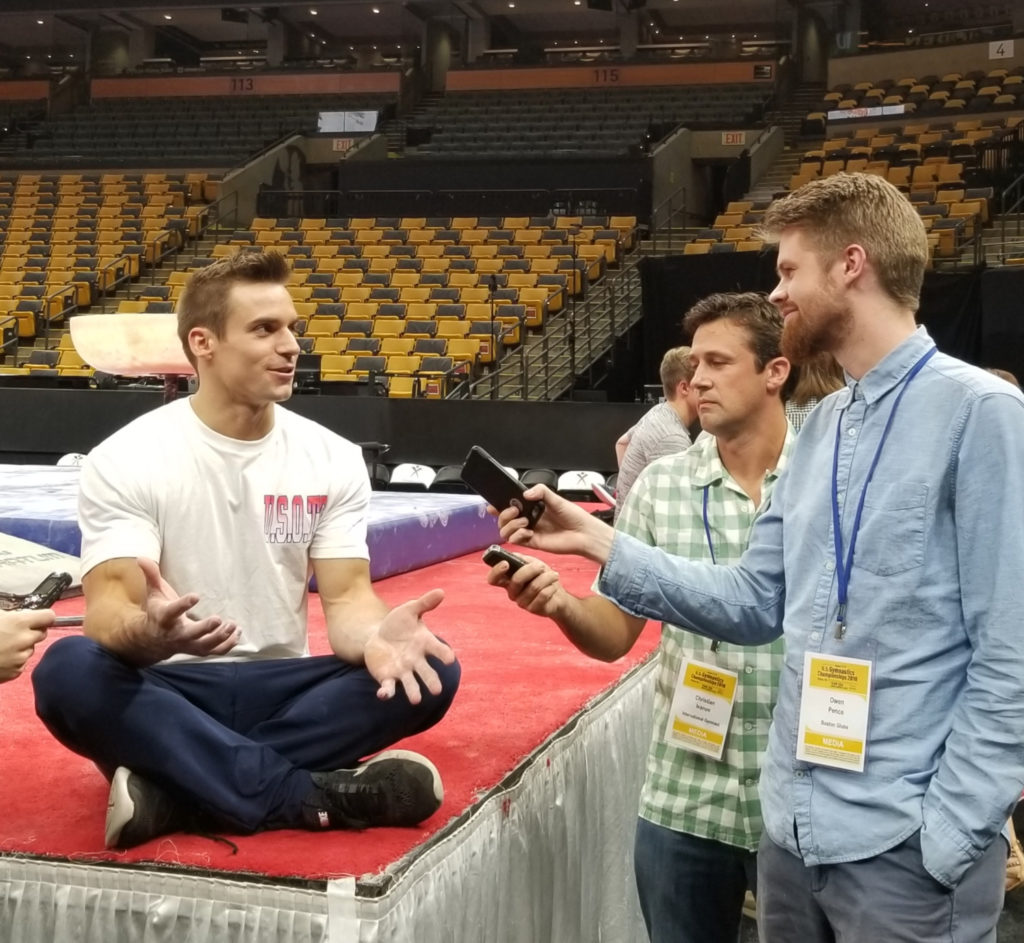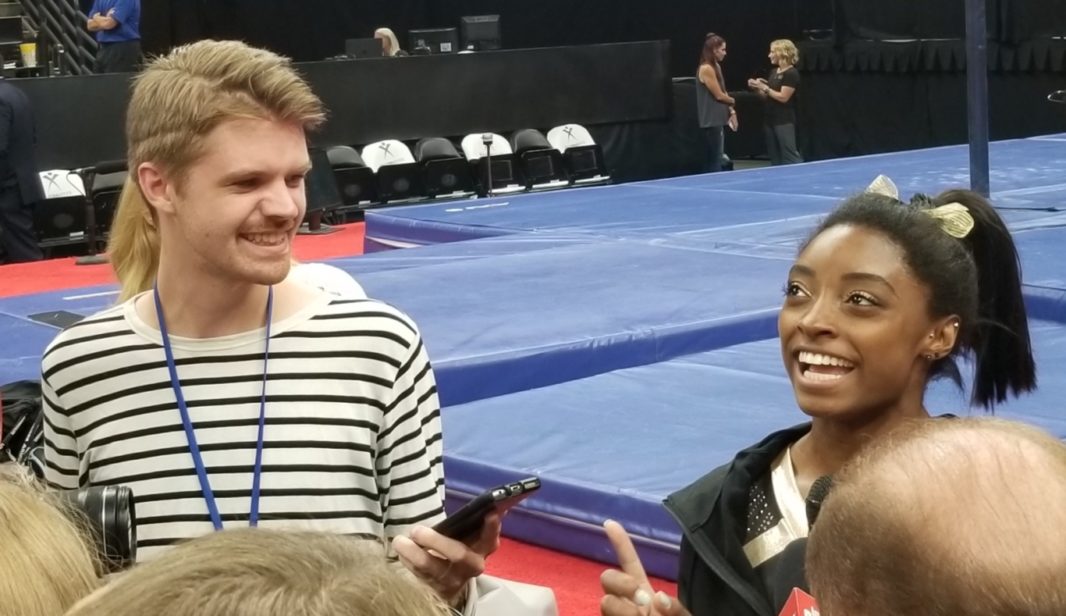In the short time since graduating from the School of Journalism, Owen Pence has written about sports for The Boston Globe, the Houston Chronicle, the Dallas Morning News, and the Star Tribune.
His work at the Globe started while he was still a student at Northeastern. Initially, he had a focus on high school sports around the state, though Owen would soon be attending some of the biggest events in all of sports. In 2018 he found himself at the U.S. Gymnastics Championship, as well as inside the stadiums of the Boston Red Sox, the New England Patriots, and the Boston Celtics.
We sat down with Owen to ask him a few questions about his experience in the world of sports, his future in journalism, and his time at Northeastern.
As a sports correspondent, what are your responsibilities, what does an “average” day at work look like for you?
Back when I was on Co-op, it was very much strictly defined by a particular beat, which was the High School Football beat. I got a schedule that was pretty consistent, looking for feature stories in different communities that might be compelling then cover games, etc. After my co-op, I transitioned into more of a freelance position popping in wherever they needed me. I’ve covered 14 different sports for the Globe since my time on co-op, and finishing classes. Assignments I ‘d get would be anything from being in the office working at the copy desk to traveling to LA for the World Series. My more normal assignments would be covering something like Boston College football on a Saturday or a Patriots practice on a weekday.
What’s your process approaching each story?
When I’m covering a game, it’s a lot more hurried. The way I of approach those stories is just taking notes throughout; say, for example, it’s a baseball game, around the 5th inning I’d start going through story ideas in my head and run through what might the most intriguing narrative be to explore. Then after the game, you need to go down and get quotes, and if its a big game you have some more time, but if you’re on a tight deadline, which you usually are, it can end up being kind of a blur.
My process for feature stories, it’s very different. You have a lot more time; you can kind of go at your own pace. I spend a fair amount of time reading what had already been written about the person, working to figure out what might be the most compelling direction to steer the interview in, and then formulate questions based off of the path you want to take. Then obviously when you’re in the interview, you have to add questions on the fly as you see fit, as long as it’s of going along with what they’re saying.

What is the hardest aspect of the job?
In my early days, I would have said it’s the deadline, but once you’ve done it so many times it just becomes second nature, and that this point I honestly enjoy it, I like how it kind of makes me go into that zone to get it done. Now, I would say the most difficult part of the job is trying to get an interesting interview out of athletes who are not as forthcoming with the media. A lot of times they’re entirely justified, but as a reporter, it creates a dilemma when you have to find out how to deliver the questions in a way, so they’re fresh, so you’re not just getting the same old answers. It can be pretty tough; it can take a lot to get people to be willing to open up.
What significant events have you covered in your time at the Globe? What were those experiences like?
I would say the first major events I’ve covered would be the Boston Marathon; I’ve been able to cover that twice. It’s been one of the more rewarding events I’ve been able to cover, because it’s really the one day that city can be kind of galvanized by one event, and everyone stops what they’re doing and really puts things on pause, and to be at the center of that was very cool.
I was able to cover the Boston Celtics playoffs run last year. That was pretty incredible because basketball’s my favorite sport, and it was just a really fun team to cover with a lot of great guys to talk to, and they were also really entertaining to watch.
I got to cover the U.S. Gymnastics Championship, which was probably the most awe-inducing athletic event I’ve ever witnessed. Being able to interview and write about Simone Biles was the one of, if not the coolest, experiences I’ve had professionally so far, just because of how amazing she is, and the gravitas she carries.
Lastly would be the Red Sox playoff run, I got to cover all the home and away games. I got to go to New York, Houston, Los Angeles and being able to cover what I believe is the greatest Red Sox team of all time. Being able to be a part of that, covering some of the games that will definitely go down in baseball lore, it was incredible.
What made you want to go into covering sports, and are there any other subjects you’d like to cover in the future?
I was talking to Steve Buckley, who used to be a columnist at the Herald, and now he’s at the Athletic, and he asked me ‘did you get into this industry for the sports, or the writing?’ And I said the writing. Writing has always been the one thing I feel I was good at, and it just so happened that I was playing sports, and have just been around sports my entire life. It was just natural to combine those two things, so that’s really how broke in, but that definitely means I don’t want to limit myself to that in the future, and box myself in. Yeah, in the future I’d love to write about music, to write about television, to write about movies, you know, stuff like that. I realized that hopefully, you know, ‘knock on wood,’ a writer’s career is supposed to be a long one, so I hope to be able to get to other stuff in the future.

Other than co-op, what experiences in your time at Northeastern best prepared you for the field?
Definitely the Magazine Writing class I took with Carlene Hempel. When I was choosing between Liberal Arts colleges and Northeastern, the co-op program was what ultimately drew me here, but I was always a little concerned in the back of my head, ‘would I have become a better writer if I had just gone for an English degree?’. I’m ultimately happy that I didn’t, just because I still got some of that amazing experience in classes like Carlene’s, and it definitely helped me become a better writer, and think about how I was formulating my pieces in completely different ways. I was able to apply those lessons in later semesters; there was a class I took with Dan Kennedy, where my final paper would not have been nearly as good if it hadn’t been for the experience in that Magazine Writing class. There’s always fear as a writer that you’ll plateau, it might be irrational, but it’s still very much there, so to be able to take classes like that, where you could feel like you’re growing was one of the more valuable things I got out of school.
As a fairly recent graduate, what advice would you give to current Journalism students about life after graduation?
It sounds like the cliche and corny answer, but saying ‘yes’ to everything, to all opportunities is definitely the best advice I could give. I might not have much advice to offer since I’m still learning myself. It’s definitely a tough industry in right now, though I would say that I’ve been able to do all these cool, lucky things, at such a young age just because I was always saying ‘yes’ whenever editors would ask if I’d want to do a story, or anything else, even a shift at the copy desk. Just saying yes to all those offers not only allows you to gain valuable experience but it can also help you work your way up the ladder a little faster.
Are there any pieces you have written that stand out to you as your favorites, or that you’re most proud of?
There are three that stand out to me. My first piece that made the front page of the Sunday sports section was on Tatiana Cortez, who was a senior captain on the Boston College Softball team, that was one of the stories I’ll remember most just because of the emotional nature of the story. Her father was a veteran of the Houston Police Department, and he was shot in the line of duty, resulting in him being paralyzed from the waist down. They were very close; he was always supportive of her and her softball. Afterward, she took some time off form the team to go and visit him. She came back to the team and played on Senior Day, her father wasn’t able to be there, but the rest of the family was; I was able to meet them, and they were all incredible. Then, of course, she hits a walk-off home run on Senior Day, it was just this perfect type of Hollywood style story.
Then I would put being able to write about Simone Biles at the U.S. Gymnastics Championship, where she was able to win another senior women’s title. Just being able to write about someone of that stature was incredibly significant to me.
The last one I’d mention was when the Red Sox were able to win the American League pendent in Houston. It was very much a story that was right up my alley because it was about sports, but it was really just about the team, and how they were reacting to heading to the world series in the initial moments after clinching the pendant. I tried to kind of set the scene of the celebration, talking of the music, the food, and the family members that were there. That was great, those kinds of stories that are always the most fun to write.


